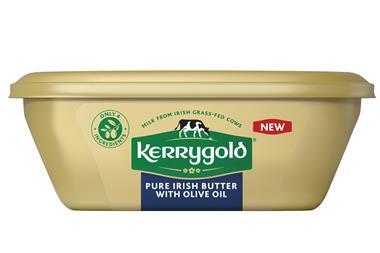The European Commission has launched a Europe-wide investigation into supermarket dairy pricing, after finding huge commodity price drops had led to a retail price drop of just 2%.
The Grocer first highlighted disparities in retail and farmgate dairy prices in the UK in October 2008. We revealed that, at the time, farmgate butter prices had dropped 35%, but retail prices were up 22% year-on-year. Cheddar prices behaved in a similar way, with retail prices up 30% and wholesale down 11%.
Recent research by the EC showed this trend extends to other dairy products and other European countries. The EC found on average that wholesale butter prices across Europe were down 39% year-on-year, skimmed milk powder (SMP) down 49%, cheese down 18% and milk down 31%. Retail prices had fallen just 2%.
The report noted retail prices typically remained 14% above 2007 levels, prior to last year's price surge.
"The magnitude, the delay and asymmetry in the downward adjustment of dairy consumer prices which is particularly marked in some member states clearly shows that the EU dairy supply chain does not function efficiently," the report stated.
"Preventing consumers from benefiting from lower prices constrains the development of demand for dairy products and thus hinders the strength and pace of recovery of the sector. This situation raises serious concerns regarding the distribution of value-added in the chain between farmers, milk processing factories, the dairy industry and retailers."
High retail prices were reducing consumer demand meaning the EU was forced to step in with export subsidies and private storage, industry experts said. This was a major factor in the return of the butter mountain, which has cost EU taxpayers 600m since January. At present 82,000 tonnes of butter (see panel) and over 200,000 tonnes of SMP are in storage.
"High retail prices reduce consumer demand, which is exacerbated by recession," said Provision Trade Federation dairy analyst Mike Bessey. "If retail prices could fall as far as wholesale markets, consumers would buy more dairy goods at lower prices, and intervention measures would receive less take-up and be less necessary."
The EC said it would work with national competition authorities to examine anti-competitive practices and had also commissioned an independent fast-track survey.
The Office of Fair Trading would not say whether it was working with the EC. The OFT fined supermarkets and processors £116m in 2007 as part of its own investigation into dairy. Morrisons and Tesco continue to contest the ruling.
The Grocer first highlighted disparities in retail and farmgate dairy prices in the UK in October 2008. We revealed that, at the time, farmgate butter prices had dropped 35%, but retail prices were up 22% year-on-year. Cheddar prices behaved in a similar way, with retail prices up 30% and wholesale down 11%.
Recent research by the EC showed this trend extends to other dairy products and other European countries. The EC found on average that wholesale butter prices across Europe were down 39% year-on-year, skimmed milk powder (SMP) down 49%, cheese down 18% and milk down 31%. Retail prices had fallen just 2%.
The report noted retail prices typically remained 14% above 2007 levels, prior to last year's price surge.
"The magnitude, the delay and asymmetry in the downward adjustment of dairy consumer prices which is particularly marked in some member states clearly shows that the EU dairy supply chain does not function efficiently," the report stated.
"Preventing consumers from benefiting from lower prices constrains the development of demand for dairy products and thus hinders the strength and pace of recovery of the sector. This situation raises serious concerns regarding the distribution of value-added in the chain between farmers, milk processing factories, the dairy industry and retailers."
High retail prices were reducing consumer demand meaning the EU was forced to step in with export subsidies and private storage, industry experts said. This was a major factor in the return of the butter mountain, which has cost EU taxpayers 600m since January. At present 82,000 tonnes of butter (see panel) and over 200,000 tonnes of SMP are in storage.
"High retail prices reduce consumer demand, which is exacerbated by recession," said Provision Trade Federation dairy analyst Mike Bessey. "If retail prices could fall as far as wholesale markets, consumers would buy more dairy goods at lower prices, and intervention measures would receive less take-up and be less necessary."
The EC said it would work with national competition authorities to examine anti-competitive practices and had also commissioned an independent fast-track survey.
The Office of Fair Trading would not say whether it was working with the EC. The OFT fined supermarkets and processors £116m in 2007 as part of its own investigation into dairy. Morrisons and Tesco continue to contest the ruling.














No comments yet